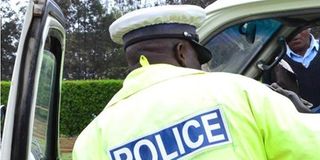How motorists are losing millions in illegal traffic fines

A traffic policeman on duty in Nyeri. FILE PHOTO | JOSEPH KANYI |
What you need to know:
- Motorists Association of Kenya safety chairman Paul Kimani said the exorbitant fines encourage corruption.
- The government should prepare to be sued by those who have paid the illegal penalties.
Motorists are paying millions of shillings daily in fines for non-existent traffic offences in an unprecedented rip-off driven by collusion between police and courts.
The most affected are those who are caught by the speed police.
The traffic law is clear that an offence is only committed if a speed limit is exceeded by more than 20 kph.
If one does 70 kph on a 50-kph stretch or 120 kph on a 100-kph stretch, no offence is committed.
Yet thousands of motorists are charged Sh1,000 for every extra kph above the speed limit.
In Nairobi alone, courts collect as much as Sh1.5 million daily, according to charge sheets seen by Saturday Nation.
Much more is paid in bribes by those avoiding the hefty fines and the bruising court process. The Traffic Act (Section 70) also requires that traffic signs be put up specifying speed limits.
Unbeknownst to many Kenyans, the speed limit on a dual carriage way is fixed at 110 kph, yet the Thika Superhighway has many 100 kph signs.
Traffic police have also been extorting money from private motorists who do not have first aid kits and fire extinguishers yet the law requires that only public service vehicles should have them.
'NON-EXISTENT OFFENCES'
On Friday, Motorists Association of Kenya safety chairman Paul Kimani said the exorbitant fines encourage corruption.
In court, he said, magistrates take pleas without interrogating the validity of the charge sheet.
“Some law enforcers dictate non-existent offences then state very high fines and jail terms. They know that when Kenyans hear, they will opt to bribe them instead,” Mr Kimani said.
He said 95 per cent of motorists who make it to the courts usually plead guilty so that they can pay fines and be on their way. They do not know that when they do that, they lose merit points on their driving licences.
“When you plead guilty to reckless driving, you lose 14 points. You lose 6, 3 and 6 demerit points when you plead guilty to speeding, obstruction and overtaking without a clear view, respectively,” Mr Kimani said.
“We do not enjoy the Constitutional rights which states that every accused person is entitled to the benefit of the least severe of the prescribed punishments for an offence” he said, “the officers do not even explain what offence you committed”.
Motorists are also fined way above the stipulated amounts, which is abetted by ignorance of the law.
City lawyer Allen Waiyaki Gichuhi said Section 117 of the Act spells out the statutory maximum penalty for minor traffic offences. “The fine for exceeding the speed limit of 50 kph is Sh300 and exceeding the speed limit prescribed for a class of vehicle is Sh500,” Mr Gichuki says in a commentary on this page.
The government should prepare to be sued by those who have paid the illegal penalties.
'ABUSE OF POWER'
Consumer Federation of Kenya General Secretary Stephen Mutoro said there was a problem with the manner in which public institutions approach the law.
“The law is being enforced and effected by different forms of corruption and abuse of power on different levels harassing and exploiting Kenyans” Mr Mutoro said.
He doubted if all the money collected as fines by the officers ever makes it to the exchequer. He said that Cofek was pushing for the Judiciary to have a centralised and electronic form of payment so that someone is fined instantly and get a receipt.
“We need to make sure that payment will be automated to prevent the officers from handling cash,” Mr Mutoro said.
He alleged that some mobile courts which were designed to speed up the prosecution of traffic offenders became exploitation havens for hapless Kenyans.
“We have reports of cartels made up of prosecutors, police officers, National Transport and Safety Authority officials and some magistrates who minted millions of shillings from Kenyans during that period,” he said. He added that he was issued with a fake receipt for a Sh30,000 fine he paid.
Traffic Commandant Charlton Murithi however said the claims of corruption and exaggerated fines by the police were baseless.
“Our job as officers is to enforce the law. We do not impose fines on motorists. We arrest those who break the law,” Mr Murithi said.
He added that he was ready to receive any complaints about officers breaking the law.





